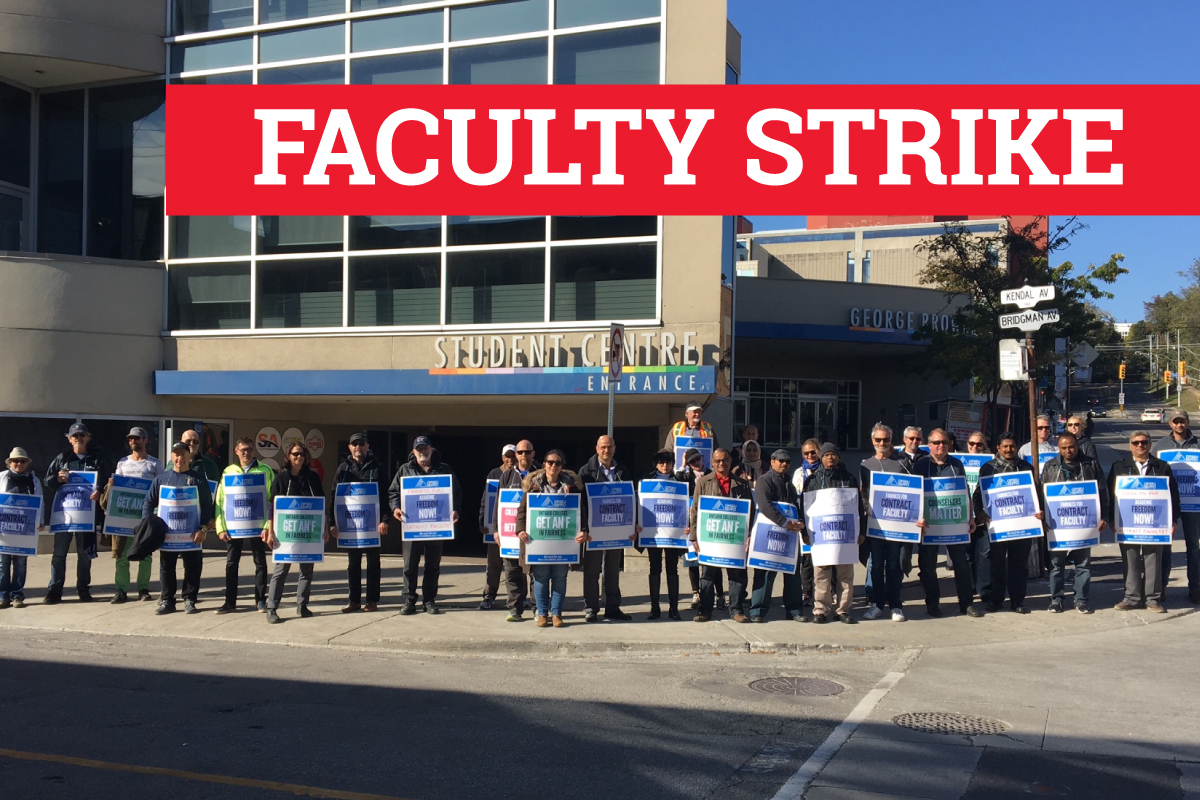Faculty strike averted at Ontario colleges as both sides agree to a new contract! After weeks of tense negotiations and the looming threat of a disruptive strike, Ontario college faculty and administrators have reached a deal. This agreement avoids significant disruption to students’ academic lives and addresses key concerns raised by faculty regarding salaries, benefits, and working conditions. The agreement’s details, including salary increases and changes to benefits packages, will be closely scrutinized by all stakeholders.
This averted strike represents a significant victory for both sides, showcasing the power of compromise and negotiation. The agreement’s implications extend beyond the immediate resolution, impacting the long-term financial stability of the colleges, their public image, and potentially influencing future labor negotiations within the Ontario college system. We’ll delve into the specifics of the agreement, exploring the concessions made, student reactions, and the broader implications for the future of Ontario colleges.
Ontario College Faculty Strike Averted: Agreement Details: Faculty Strike Averted At Ontario Colleges As Both Sides Agree To
The looming faculty strike at Ontario colleges has been averted thanks to a last-minute agreement between the college faculty and the college administration. This agreement addresses key concerns regarding salary, benefits, and working conditions, preventing a potentially disruptive impact on students and the academic calendar.
The Agreement’s Key Provisions

The agreement reached encompasses several crucial aspects, representing compromises from both the faculty and the college administrations. Significant improvements were made to salary increases, benefits packages, and workload considerations. Here’s a detailed breakdown:
| Item | Previous Offer | Agreed Terms | Impact |
|---|---|---|---|
| Annual Salary Increase | 1% per year for three years | 2% per year for the first two years, 2.5% in the third year | Substantially improved compensation for faculty, addressing concerns about lagging salary growth compared to inflation and cost of living. |
| Benefits Package | Minor adjustments to existing plan | Enhanced dental and vision coverage, increased employer contribution to pension plan. | Improved benefits, addressing faculty concerns about healthcare affordability and retirement security. |
| Workload | No significant changes proposed | Improved provisions regarding course preparation time, reduction in administrative burden, and clearer guidelines on teaching loads. | Reduced faculty workload, improving work-life balance and reducing stress. |
| Job Security | No change | Enhanced protections against arbitrary dismissals and clearer processes for contract renewals. | Greater job security and increased fairness in employment practices. |
Student Impact and Reactions
The successful avoidance of a strike has significantly positive implications for students. The uninterrupted academic year safeguards students’ progress, avoiding potential delays in graduation and course completion. Student representatives expressed relief and satisfaction with the outcome.
Student representatives from various colleges reported a sense of relief and expressed their gratitude for the averted strike. They emphasized the importance of uninterrupted learning and the potential negative consequences a strike would have had on their academic goals and overall well-being.
Infographic Description: The infographic would depict a timeline showing the negotiation period. The initial phase would be shown with a stormy, tense atmosphere, representing the threat of a strike. As the negotiations progressed, the visuals would gradually shift to calmer scenes, symbolizing progress towards an agreement. The final section would illustrate a clear, sunny day representing the successful resolution, with happy students resuming their studies.
The timeline would also feature key dates, such as the initial strike announcement, key negotiation points, and the final agreement date.
Faculty Perspectives and Concerns

Faculty concerns primarily revolved around fair compensation, manageable workloads, and improved job security. Initial demands included significant salary increases to reflect the increasing cost of living and to address salary stagnation. They also sought improvements in benefits and a reduction in administrative burdens. Faculty representatives expressed satisfaction with the final agreement, highlighting the improvements in salary, benefits, and workload considerations as significant victories.
- Compensation: Addressing salary increases to match inflation and cost of living.
- Workload: Reducing teaching loads and administrative burdens.
- Benefits: Enhancing healthcare and pension plans.
- Job Security: Improving contract renewal processes and protections against arbitrary dismissal.
The Role of the Ontario Government, Faculty strike averted at Ontario colleges as both sides agree to
The Ontario government played a significant, albeit indirect, role in the negotiations. While not directly involved in the bargaining process, the government’s funding policies for colleges indirectly influence the colleges’ capacity to meet faculty demands. The financial implications of the agreement for the province will likely involve increased funding allocations to the college system. This response is consistent with past approaches to similar labor disputes in the post-secondary education sector.
The government’s influence can be seen in the overall willingness of the colleges to reach an agreement that is financially viable given the existing funding structure.
Long-Term Implications for Ontario Colleges

The agreement’s long-term financial effects on colleges will require careful budget management. The increased salary and benefit costs will need to be factored into future budgets. The successful avoidance of a strike will help maintain the colleges’ reputation and public perception. The agreement might lead to some adjustments in college policies and procedures, particularly concerning workload management and course scheduling to accommodate the improved faculty working conditions.
Timeline: The timeline would begin with the initial faculty contract expiry date, followed by the breakdown of negotiations, the announcement of a potential strike, the intensification of negotiations, the eventual agreement, and finally, the resumption of classes. Significant turning points would include the initial rejection of the college’s offer, the government’s statements regarding funding, and the final agreement date.
So, the Ontario college faculty strike is officially off! Both sides reached a deal, which is great news for students. While that’s settling down, you might want to check out the game details for Penn State vs. Notre Dame: Time, TV channel, preview for the if you’re into college football. Back to the Ontario colleges, hopefully this means a smooth semester ahead for everyone involved.
Concluding Remarks
The averted faculty strike at Ontario colleges marks a turning point, demonstrating the potential for productive dialogue even in the face of significant disagreements. While the details of the agreement will undoubtedly be analyzed and debated, the avoidance of a potentially devastating strike is a positive outcome for students, faculty, and the colleges themselves. The long-term effects remain to be seen, but this resolution provides a crucial opportunity to rebuild trust and foster a more collaborative environment within the Ontario college system.
The focus now shifts to implementing the agreed-upon changes and ensuring a smooth transition for the academic year.
Q&A
What were the main sticking points in the negotiations?
So, the Ontario college faculty strike’s been avoided – both sides finally saw eye-to-eye. It’s a relief, honestly, kind of like when you hear some completely unrelated news, like that Sean Dyche: Everton manager sacked before FA Cup game with Aston Villa. Anyway, back to the colleges – hopefully, classes resume smoothly now that the agreement is reached.
Key issues included salary increases, benefits (particularly health insurance), workload concerns, and job security.
So, the Ontario college faculty strike’s been avoided – both sides finally came to an agreement! It’s a relief for students, but while that was happening, I was glued to the hockey game where, check this out, Dubois scores twice, lifts Capitals past Canucks in OT. Pretty exciting stuff, but back to the colleges – hopefully, classes will resume smoothly now.
How will this agreement affect tuition fees?
The direct impact on tuition fees is unclear and will depend on how the colleges manage the increased costs associated with the agreement.
What is the timeline for implementing the new contract?
The implementation timeline will likely be Artikeld in the full agreement document and will likely be phased in over time.
Were there any government mandates involved in the agreement?
The extent of government involvement and any mandates will need to be clarified through official statements and the released agreement.
